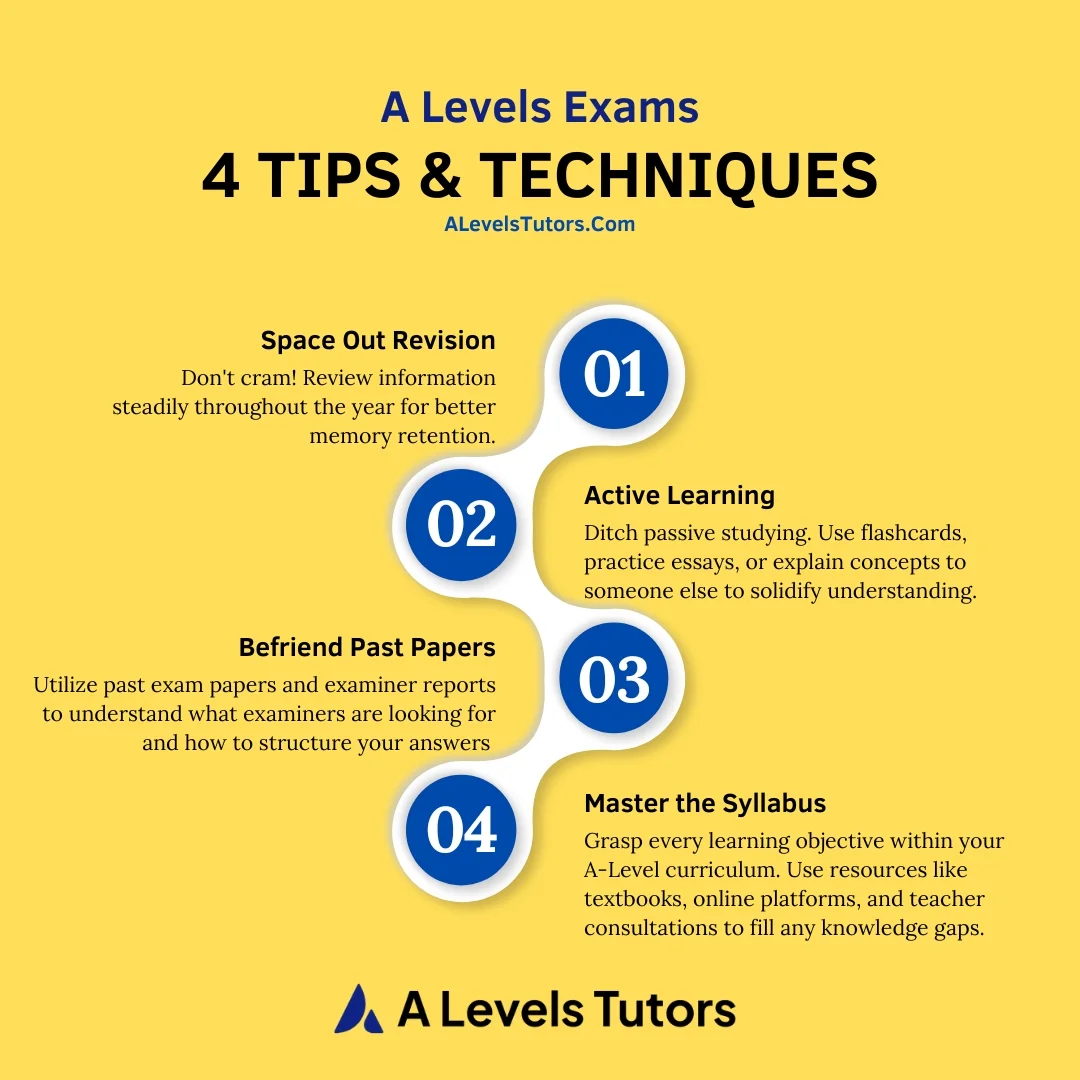
A Levels Exams Tips
A Levels exams can be difficult, but with the appropriate strategies, you can do your best. The following A Levels exams tips and techniques can help you perform well on your A Levels exams:
1- Understand the Exam Format:
Familiarize yourself with the format of each A Levels exam you’ll be taking. Know the types of questions (e.g., multiple-choice, essay), the duration, and any specific instructions.
2- Start Early:
Begin your exam preparation well in advance. Cramming is not an effective way to retain information and can lead to stress.
3- Create a Study Plan:
Develop a detailed study plan with a schedule for each subject or topic. Allocate more time to subjects you find challenging or those with upcoming exams.
4- Prioritize Key Topics:
Identify the most important topics and focus on mastering them. Consult your syllabus or teacher for guidance.
5- Practice Past Papers:
Practice with past A Levels papers. This helps you become familiar with the exam style and improve your time management skills.
6- Effective Note-Taking:
Take clear, organized notes during your classes and study sessions. Summarize complex concepts and use mnemonic devices to remember key points.
7- Active Learning Techniques:
Employ active learning methods, such as teaching the material to someone else or creating flashcards, to reinforce your understanding.
8- Use Online Resources:
Utilize online resources, including educational websites, videos, and forums, to supplement your learning and gain different perspectives. Even hire A Levels tutors if need be for better preparation.
9- Self-Testing:
Regularly test yourself with practice questions and quizzes to assess your knowledge and identify areas that need further study.

10- Time Management:
Manage your time wisely during the exam. Allocate a specific amount of time to each question and move on if you get stuck, returning later if necessary.
11- Read Instructions Carefully:
Before you start answering questions, read the instructions thoroughly. Ensure you understand what is expected in each section.
12- Answer All Questions:
Attempt to answer all the questions, even if you’re unsure. Leaving questions blank guarantees zero points, while partial answers might earn some credit.
13- Manage Exam Anxiety:
Practice relaxation techniques like deep breathing or mindfulness to manage anxiety. Arrive at the exam venue early to reduce stress.
14- Review and Revise:
Allocate time for revision as the exams approach. Review your notes and practice questions to reinforce your understanding.
15- Stay Healthy:
Prioritize your physical and mental well-being. Get enough sleep, eat nutritious meals, and exercise regularly to stay focused and alert.
16- Mock Exams:
If possible, take mock exams under timed conditions to simulate the actual exam environment and assess your preparedness.
17- Stay Positive:
Maintain a positive attitude throughout your exam preparation and during the exams themselves. Self-confidence can have a significant impact on your performance.
18- Plan Your Time in the Exam:
Allocate time for reading the entire paper, planning your answers, and checking your work at the end of the exam.
Remember that everyone’s study and exam strategies may vary, so adapt these A Levels exams tips and techniques to suit your learning style and preferences. Consistency, effective preparation, and a calm mindset can significantly improve your performance in A Levels exams for all boards including but not limited to Cambridge, Edexcel.
Find A Levels Tutors
Find A Levels home tutors in Lahore, Karachi, Islamabad, and Rawalpindi, Pakistan; and online tutors anywhere globally be it London, Dubai, Jeddah, Singapore, Kuwait, Cairo, Bangkok, Birmingham, Abu Dhabi, Doha, Muscat, or any other destination. If you need a quick revision, and help with your past papers for Maths, Chemistry, Biology, Physics, Accounting, English, Sociology, Psychology, Computer Science, or any other subject of Cambridge, AQA, Edexcel, and OCR board for AS, A2, or composite exam.


